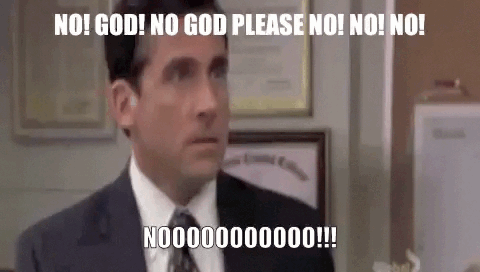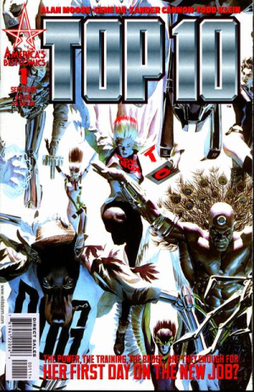I’ve never understood people who say “I can’t start a new television show, I’m already in the middle of three.” Okay, that’s not true, I understand that fine, otherwise I’d have started watching Breaking Bad by now instead of saying “But I haven’t finished The Wire.” But my threshold for “TV series I can follow” is much higher.
The problem is, I can’t just watch a TV show until I’ve run out of that TV show. Sometimes I can, I suppose, like last month when I managed to get through four seasons of It’s Always Sunny in Philadelphia in a week and a half, but that’s a rare exception. If I’m settling in for some TV, it’s usually based on mood. Sometimes I want something legitimately amazing, like the Wire or Justified. Sometimes I’d rather something light and funny, like the New Girl or Psych. Sometimes those cable dramedies with mismatched duos solving crimes or suing bad people (with some serial elements) are just the ticket: White Collar, Suits, Psych again I suppose, or Leverage (not a duo, but still in that genre). Sometimes I realize that Bruce Campbell has been on a TV show for six years and I haven’t been watching it, so it’s time to watch some Burn Notice. And sometimes an episode of Person of Interest or Arrow exists that I haven’t seen and, well, that can’t be allowed to continue.
And apparently I sometimes need to watch something great but incredibly grim.
There are shows out there with such an overwhelming atmosphere of gloom or dread that they make Game of Thrones seem sunny and hopeful, and when they’re well done enough, sometimes I can’t quite get enough of them. Well, to a point. There can come a point with any show I’m not watching on a weekly basis when the plotline becomes dark enough, uncomfortable enough, or so cloaked in ill portent that I have to take a break, because maybe watching the protagonists I’ve come to love get bitch-slapped for an hour feels taxing. But I come back. I always come back.
Here’s some examples of recent shows that are as addictive as particularly moody heroin.
House of Cards
What’s it about? When ruthless Congressman/House Whip Francis Underwood (Kevin Spacey) is passed over for Secretary of State, he and his equally conniving wife (Robin Wright) begin a campaign against the President he helped get elected, a campaign for revenge and power.
Why do you like it? Ever since the 90s, I’ve been a fan of Kevin Spacey and been kind of a fan of stories that dare you to root for someone thoroughly amoral by making him/her the central character of the story. The best example I can think of is the woefully short-lived and before-its-time series Profit, featuring Adrian Pasdar in a similar role to Kevin Spacey, only with corporate politics being the battlefield in place of Francis’ actual politics. Watching Francis carry out his plans, the glee he shares solely with us, the audience, as he manipulates his targets into his traps, it can be so much fun to watch that you occasionally forget you’re watching a monster toying with his prey.
What makes it grim? Francis’ enemies are many, and they are crafty. Multinational corporations and corrupt billionaires, the sorts of people with no problems taking on the White House. People I don’t like seeing get the upper hand.
When things get rough for Francis, and they do, I try to remind myself that he’s a terrible, terrible person who, honestly, could use a little comeuppance. And yet… who else am I supposed to root for? The few actually good people on this show just get chewed up and spat out in his wake, and the people challenging him are way worse than he is! If you’re not going to root for Francis, and he does not always make it easy to do so, the pickings are pretty slim.
When did you give it up/come back? Usually about two thirds of the way through a season, when things are going from bad to worse, I’ll decide I need a breather. This can last several months. But I’ll be back. I always come back.
Hannibal
What’s it about? FBI profiler Will Graham hunts serial killers with the help of his friend and therapist, Dr. Hannibal Lecter.
Will Graham was the protagonist of the earlier and less-known Hannibal Lecter novel, Red Dragon, adapted twice into film (1986’s Manhunter, with CSI’s William Petersen as Graham and Brian Cox as Hannibal, and 2002’s Red Dragon, with Edward Norton as Graham and Anthony Hopkins reprising as Hannibal). In the novels, it was Will who caught Hannibal in the first place. In the TV series… he hasn’t made it that far yet.
Special Agent Jack Crawford (Lawrence Fishburne) recruits Will Graham for his ability to put himself in the mind of a serial killer, to read a crime scene and figure out what’s driving his quarry, summing up the method and the madness of the kill with the phrase “This is my design.” Crawford does this despite knowing that Will is on the spectrum of personality disorders, albeit closer to autistic than psychotic. Or so Will claims. Crawford also goes against the advice of Will’s friend and colleague Alana Bloom, who worries that Will’s mind may not be able to withstand so much time in the dark places Jack is dragging it. But Jack needs Will to catch the country’s worst and most brutal serial killers, including Jack’s own white whale, the Chesapeake Ripper, so to keep Will functioning, Jack asks for the help of psychiatrist and amateur gourmet cook Hannibal Lecter.
Of course Hannibal is the Chesapeake Ripper, but they don’t know that.
Soon Hannibal and Will are joining forces to hunt murderers, while Hannibal begins to play with Will’s mind, just to see what will happen.
Will Graham might sum up Bryan Fuller’s approach thusly: “I attract the curious with Hannibal’s name recognition. I lull networks and audiences into false security with the trappings of a crime procedural, only to find new ways to horrify each week. I parade beautifully-shot atrocities across the camera, erode hope by whittling away at the heroes, yet leave the viewer craving another taste.”
“This is my design.”
Why do you like it? It’s from Bryan Fuller, who’s quickly challenging Joss Whedon and Aaron Sorkin as my favourite TV writer. He’s the creator of my beloved Pushing Daisies, and is responsible for most of the good episodes of Heroes. So it’s incredibly well written. Hannibal’s cold calculations and Will’s descent into madness are hard to turn away from, even when you really, really want to.
Former Bond villain Mads Mikkelsen (Casino Royale) makes for an exceptionally chilly Hannibal Lecter, warm and friendly when the situation calls for it, eerily calm and scarily brutal when he lets his true colours show (typically in front of rival killers, moments before removing them). Hugh Dancy is every bit his equal as the tormented Will Graham. And if those two and Lawrence Fishburne weren’t enough, the show’s attracted some pretty impressive guest stars, including former Kid in the Hall Scott Thompson making regular appearances as one of the forensic pathologists on Jack’s team, Gina Torres as Jack’s cancer-stricken wife, Gillian Anderson as Hannibal’s therapist, and most fun to watch is Eddie Izzard as Dr. Abel Gideon, a serial killer who attempts to claim the title of Chesapeake Ripper, putting him in the real Ripper’s sights.
The sequences in which Will puts himself in the killer’s mind are fascinating to watch, as he rewinds the crime, picks apart the technique, and finds the thing that drives the killer, often able to spot a copycat just from inconsistencies in how the victim is displayed.
It’s sharply written, beautifully shot, with a stellar cast. I’d be more surprised it isn’t hip-deep in Emmys if it weren’t so remorselessly bleak.
What makes it grim? Simply put, the world Hannibal and company inhabit seems terrifying. Every week they are hunting down another serial killer out of your darkest nightmares. And it’s never “He strangles blonde prostitutes to death and leaves them in dumpsters” serial killers, no. Never so gentle. Girls are left impaled on deer antlers. One used his victims’ intestines to make violin strings. Another used the bodies to grow mushrooms. Another stacked his victims into a totem pole. And throughout it all, Hannibal is still killing to keep his larder full for dinner parties.
This show will make you hungry. You know it shouldn’t. You know, deep down, that is not beef he’s cooking… but gods damn Hannibal’s dinner parties look amazing. That twisted bastard knows how to cook, and how to plate.
Plus, you know, the protagonist (the one who isn’t an unfeeling psychopath likely to serve your lungs to his guests with just the perfect selection of side dishes and garnish) is being slowly broken from the inside out, so there’s that.
It’s actually kind of hard to believe it’s on a network. If this is what NBC lets them get away with, I don’t want to think about what they could do on HBO.
When did you give up/come back? Last summer I started falling behind on Hannibal. Honestly it was Will’s torments that did it. I was scared of what Hannibal was doing to Will, and chose sunnier climes for my TV entertainment for a while. But when season two started, and I started getting close to having episodes auto-delete from my PVR, I jumped back in, and it was worth it. While not much cheerier, for reasons I shan’t spoil, season two might even be better than season one.
True Detective
Meanwhile, HBO decides it shan’t be outdone for disturbing serial killer stories.
What’s it about? In 1995, freshly partnered Louisiana state police detectives Rustin Cohle and Marty Hart are called in on the murder of a woman found posed in a ritualistic manner. In 2012, an older, sadder Hart and the burnt-out yet still sharp Cohle tell the story of the investigation that followed to two other detectives, who have questions about newer, similar murders. Rumours of someone called the Yellow King and a place called Carcosa point to a larger, darker truth behind it all than the simple answer Cohle and Hart are expected to find.
Why do you like it? Because it is goddamn mesmerizing.
While Carcosa and the Yellow King are clear references to Lovecraft-precursor Robert W. Chambers’ The King in Yellow, this is not a story in which elder gods rise to consume the world. If you go in expecting aliens, gods, and monsters to appear, you’ll be disappointed. And yet it holds true to one aspect of The King in Yellow short stories and the works of H.P. Lovecraft they helped inspire: the idea of a protagonist driven mad by horrifying truths. They simply trade the cosmic horrors of Lovecraft and Chambers for staggering truths about how awful the world can be, and it’s clear from episode one that something about this case eventually broke Cohle in a way he’s yet to recover from in 2012.
At its heart, this is the story of the relationship between the nihilistic Rustin Cohle and the self-destructively hedonistic Martin Hart. The case connects them, divides them, and brings them back together years later as the new investigation unearths all they tried to leave behind. Along the way there are pulse-pounding chases and confrontations and a possible state-wide conspiracy, but it’s always truly about Cohle and Hart, and man they are worth watching. The series is anchored by a spellbinding performance by Matthew McConaughey, which is not a sentence I ever expected to say. Woody Harrelson more than holds his own as the less intellectual partner, constantly annoyed by Cohle’s pessimistic rants.
The writing is brilliant. The direction is amazing. They have one of the most impressive single-take long shots I’ve ever seen. It’s eight episodes, and while the second season is already green-lit, it will be a new story with new leads, so the first season is completely self-contained, with a firm end. And man does the final episode become more intense when you have no idea how it’s all going to end, or who will still be standing when it does.
If this doesn’t clean up at the Emmys this year, I would hope the voters have a hard time meeting their own gaze in the mirror.
What makes it grim? I mentioned the horrible truths about the world, right? Rustin Cohle sees a dark world infested with horrors, and it’s hard to not see his point, even beyond the crimes he and Hart uncover.
When did you give it up/come back? Never. I couldn’t stop. Once I started watching the show I needed it like a drug. It haunted my thoughts for over a month. Like the characters themselves, I may never truly leave Carcosa.












